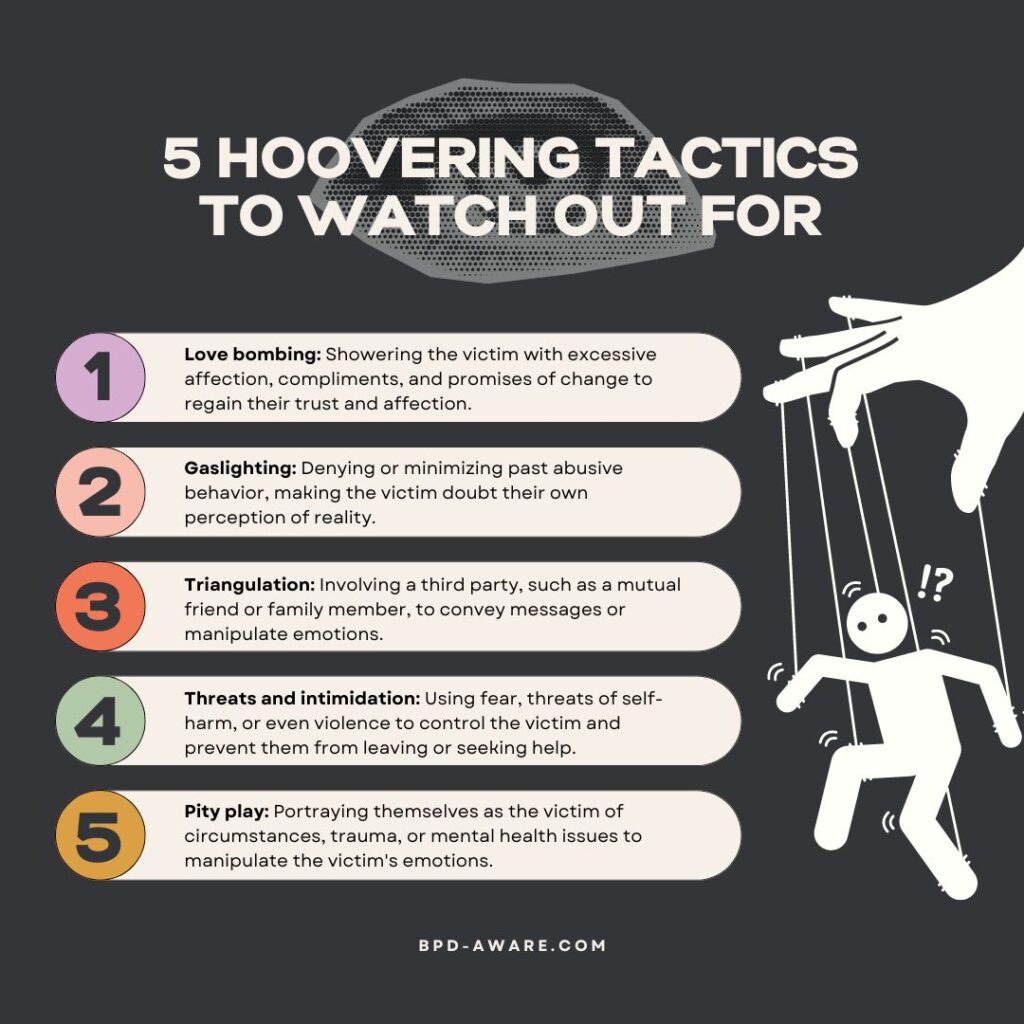Hoovering is a manipulation tactic that uses several techniques to suck people back into a toxic relationship. This is relevant to people with Borderline Personality Disorder (BPD) because they can be susceptible to hoovering from people with narcissistic tendencies. It’s also a tactic that some people with BPD use for reasons we’ll go into later.
In this article, we’ll look at what hoovering is, common hoovering techniques, who uses hoovering how to defend yourself against hoovering, and how to stop hoovering others.
What is Hoovering?
Hoovering is a technique witnessed in unhealthy relationships whereby a person will attempt to draw their partner back into a relationship that they were withdrawing from by using one or more manipulative tactics.
The term hoovering comes from the vacuum brand as the technique is all about “sucking” someone back into a destructive environment.
You may have seen a friend in an unhealthy relationship with someone who treats them poorly and wondered why they keep going back to their partner. The chances are, they’re a victim of hoovering tactics.
Hoovering is a toxic behavior that has a serious effect on the mental health of the victim, and potentially their physical health too. Anyone can be a victim of hoovering but it tends to be particularly effective on people with a history of trauma or low self-esteem. This is why people with BPD can be particularly susceptible to hoovering techniques.
Hoovering Techniques
Countless tactics are used to try and hoover people back into relationships. Here are some of the most common ones:
Love Bombing: This involves showering the victim with an excessive amount of gifts, praise, or affection – sometimes all three. The goal is to manipulate the victim into believing the “good times” are back in the relationship. Of course, this rarely lasts. For more on love bombing, read our article BPD and Love Bombing.
Random Contact: The hooverer might make random contact after you’ve not heard from them for weeks, months, or even years. A text message or DM stating “I just went to that bar we used to go to and it reminded me of you. I miss you.” Beware this kind of attempt to suck you back in.
Apologies and Promises: Making an apology and promising to make the necessary changes can seem like a positive step. It’s only positive though if the apology is genuine and the person changes their behavior. Otherwise, it’s just another hoovering tactic.
Gaslighting: Gaslighting is a manipulation tactic that involves making the victim question their understanding of reality. The manipulator may swear up and down that a certain event didn’t happen, even though it did. Over time, the victim can begin to believe the manipulator’s version of events. This version is, unsurprisingly, always to the manipulator’s advantage.
Triangulation: When the manipulator uses a third party, such as a mutual friend, to convey messages, this is known as triangulation. The manipulators will make themselves look good to their mutual friend, who is also typically an unwitting victim in their plot.
Future Faking: The hooverer will paint a picture of the perfect future you could have together if only you forgave their indiscretion. This creates false hope and can suck the victim back into the relationship. Just remember: there’s no such thing as a perfect future.
The Fake Crisis: Some hooverers will go so far as to fake a crisis such as the death of a loved one or a serious illness to get you back on the hook. In certain cases, these crises may even be real but the manipulator uses the opportunity to take advantage of the situation to hoover you back in.
Threatening or Violent Behavior: The manipulator may threaten you, a mutual loved one, or even themselves with violent behavior. This is an attempt to place the blame on the victim if anything bad happens and create a web of guilt. This is perhaps the most extreme and dangerous example of hoovering tactics.

Who Uses Hoovering?
Anyone can use hoovering tactics but it tends to be people who feel insecure, vulnerable, and alone that hoover others. Many people have likely used a hoovering technique or two in their time, however, chronic hoovering is a tactic most typically employed by people within the Cluster B of personality disorders. This includes Borderline Personality Disorder, Narcissistic Personality Disorder (NPD), Antisocial Personality Disorder (ASPD), and Histrionic Personality Disorder (HPD). These personality disorders are marked by emotional instability and unpredictable and volatile behavior.
This isn’t to say that everyone within the Cluster B personality disorders uses hoovering, just that they are the most likely to exhibit chronic patterns of hoovering tactics.
People with BPD tend to use hoovering tactics as a defense mechanism against their fear of abandonment. If they sense a relationship is in trouble – whether rightly or wrongly – they may start to feel anxious and begin to use hoovering tactics such as love bombing or threats of self-harm. While this is an explanation, it shouldn’t be seen as an excuse for abusive behavior.
Defending Yourself Against Hoovering
The emotional manipulation and abuse caused by hoovering can be devastating. Fortunately, there are ways to defend yourself against it. The first is to educate yourself on hoovering and other manipulation tactics so that you can spot them when they happen. Knowledge is a great shield when it comes to manipulation.
If you do spot someone trying to hoover you, one of the best responses is to respond to their manipulation neutrally. Don’t get drawn into arguments or their attempts to gaslight you. Don’t give them anything to work with.
Another defense is to have a strong support network around you. Having a large number of people you can trust can help you avoid manipulators in the first place. It makes you harder to isolate and offers you protection from the fear of losing “the one person” in your life.
Similarly, reach out to people in your life if you suspect a partner, friend, or family member is trying to manipulate them. This has multiple benefits. It can protect you against triangulation, offer new insights into the situation, and act as a rallying call for your support network.
You might benefit from going no-contact with the person attempting to manipulate you. This means blocking their number, blocking them on social media, and generally not giving them the chance to reach out to you. This prevents them from being able to hoover you back into the relationship. They will likely get bored when they realize you’re no longer interested and go and look for a new victim.
If they don’t get the message and continue to attempt to manipulate and harass you, then it’s time to get the law involved. You may wish to contact your local law enforcement or a lawyer to discuss your options. It might seem extreme but it’s better to be safe than sorry.

How To Stop Hoovering Others
If you’ve been reading this article and realized that you might be a hooverer, you’ve already taken the first step to improving your behavior. Many manipulators never look at themselves and take responsibility for their actions. They often see themselves as the victims.
As with any toxic behavior, hoovering is a maladapted form of self-defense. As discussed earlier, people who hoover tend to feel insecure and vulnerable – they also may or may not have a personality disorder.
The best way to work through these issues is therapy. A knowledgeable therapist can help you to feel more secure and raise your self-esteem so that you no longer feel the need to manipulate people into staying around you. If you do have a personality disorder, like BPD or NPD, they can help you work on that too. Personality disorders can be overcome with therapy, effort, and (sometimes) medication.
Final Thoughts
Hoovering is a manipulative tactic designed to draw back the victim into a toxic relationship. There are many forms of hoovering including, love bombing, gaslighting, triangulation, and fake crises. Whatever the tactic, the goal remains the same: to suck the victim back into a relationship that they no longer want to be in.
Being the victim of hoovering can have devastating consequences for the mental and physical health of the prey of the manipulator. Manipulators often target those who they believe are most susceptible to their tactics, those who they see as easy prey. Being the victim of this sort of toxic behavior only makes this worse.
Ironically, it’s the manipulators themselves who are often the most insecure and vulnerable.
People with BPD can be both the manipulator and the manipulated when it comes to hoovering. The fear of abandonment and weak sense of self-identity can cause people with BPD to cling to relationships that are well past their breaking point – whether they become the manipulator or manipulated.
Like so much in life, the relationship between BPD and hoovering is rarely black-and-white.
Sources, Resources, and Further Reading
- The Manipulative Tactics of Narcissists: Hoovering Explained: https://www.verywellmind.com/narcissistic-hoovering-8407338
- What Is Hoovering? 7 Signs and How To Handle It: https://health.clevelandclinic.org/hoovering
- Person with BPD and no hoovering, how many of you have had similar experiences?: https://www.reddit.com/r/BPDlovedones/comments/173tz1n/person_with_bpd_and_no_hoovering_how_many_of_you/
















